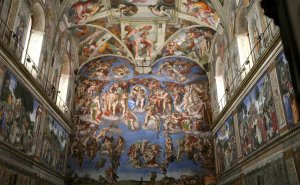A Brief Note on The Question of a Legally Valid Papal Election

Because this comes up on a fairly regular basis, I wanted to just take a brief look at the source of one of the most common claims that Pope Francis was not validly elected, according to the Church’s own rules for conclaves. It is generally based on the acknowledged existence of the so-called “Sankt Gallen Mafia” which conspired, by the admission of some of the curial members, to elect Bergoglio to the papacy. In the view of some, this means that the proscription against canvassing or pacts in papal elections in the Church’s rules were violated, and the penalties on the books thus apply, invalidating the election.
So let’s take a quick look.
Universi Dominici Gregis (UDG) is the document that was created by JPII to govern conclaves. People use paragraph 76 of UDG to try to invalidate the election of Bergoglio, but I don’t think that works at all. This is what that paragraph says:
“76. Should the election take place in a way other than that prescribed in the present Constitution, or should the conditions laid down here not be observed, the election is for this very reason null and void, without any need for a declaration on the matter; consequently, it confers no right on the one elected.”
And yet, #76 precedes the proscription against canvassing, making clear, in my view, that what precedes #76 is what is being referred to as the “way…prescribed” for an election to take place, which, if it were deviated from, would nullify the election.
But what precedes #76 of UDG has nothing to do with what the Sankt Gallen Mafia did. The rules pertaining to their efforts are found within a latter section:
CHAPTER VI
MATTERS TO BE OBSERVED OR AVOIDED IN THE ELECTION OF THE ROMAN PONTIFF78. If — God forbid — in the election of the Roman Pontiff the crime of simony were to be perpetrated, I decree and declare that all those guilty thereof shall incur excommunication latae sententiae. At the same time I remove the nullity or invalidity of the same simoniacal provision, in order that — as was already established by my Predecessors — the validity of the election of the Roman Pontiff may not for this reason be challenged.23
Then we get to the part people think is the smoking gun:
81. The Cardinal electors shall further abstain from any form of pact, agreement, promise or other commitment of any kind which could oblige them to give or deny their vote to a person or persons. If this were in fact done, even under oath, I decree that such a commitment shall be null and void and that no one shall be bound to observe it; and I hereby impose the penalty of excommunication latae sententiae upon those who violate this prohibition. It is not my intention however to forbid, during the period in which the See is vacant, the exchange of views concerning the election.
82. I likewise forbid the Cardinals before the election to enter into any stipulations, committing themselves of common accord to a certain course of action should one of them be elevated to the Pontificate. These promises too, should any in fact be made, even under oath, I also declare null and void.
You will note that this section — mentioning the behavior of the members of Sankt Gallen — follows the commentary on Simony — which is of course just as bad as collusion, if not worse. And yet, that section EXPLICITLY states that JPII has removed the election-nullifying consequence of simony such that “the validity of the election of the Roman Pontiff may not for this reason be challenged”.
After that statement, nowhere in the following paragraphs is nullity of an election even implied due to the “matters to be avoided”, including #s 81 & 82.
People read into UDG what they want to read. In my view, the document doesn’t say it. I think we have to look at it from a legal basis, which is going to take into account the specifics of how the document is structured and where the penalties are laid out – and aren’t.
A final caveat — I’m neither an expert in canon law nor in the documents that govern conclaves. If anyone is who would like to supply a more authoritative interpretation, I’d be happy to publish it here.
Correction: the original title of this post was “A Brief Note on The Question of a Canonically Valid Papal Election”. Since UDG is not a matter of canon law, we have amended the title to say “Legally Valid”. We apologize for the error.
The post A Brief Note on The Question of a Legally Valid Papal Election appeared first on OnePeterFive.
